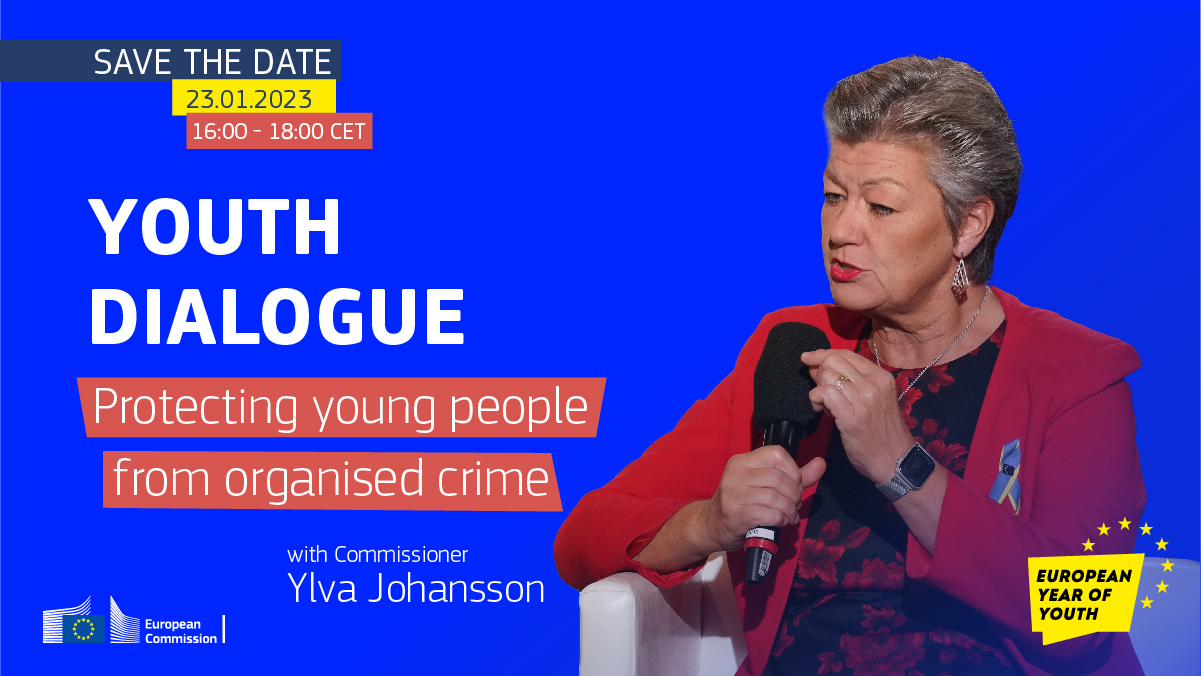Policy Dialogue with Commissioner Ylva Johansson: "Protecting young people from organised crime"
 @© European Union, 2023
@© European Union, 2023
23/01/2023 16:00
23/01/2023 18:00
[CET] Hora da Europa Central
Commissioner Johansson engaged in a discussion on security and protection from organised crime with a group of young people from all over Europe. Seventeen young participants working in law enforcement and civil society shared their experiences. They discussed the methods used to recruit young people into organised crime, how to protect those sought out and how different stakeholders, such as the EU, local NGOs, law enforcement and social services, can work together to fight organised crime.
Due to the sensitive field in which many of the participants of this policy dialogue work, it was decided not to livestream the discussion to protect their anonymity. The takeaways from the dialogue have been made available below.
Take aways from the Dialogue
- Not every young person who comes into contact with crime, ends up joining criminal organisations. Organised criminal groups target children purposefully since they do not receive the same sentences as adults, and lure them with the promises of money, status, and purpose. Therefore, young people need perspective and a sense of belonging. Children growing up in poor neigbourhoods with low levels of employment are more at risk. Some children grow up in criminal families and some grow up in closed, parallel societies with strong ties. The lack of perspective to work legally is a risk factor as well. Gender bias and toxic masculinity are important factors, which lead to young boys wanting to provide and to prove their 'toughness'. Worsening mental health and problems related to drug addiction can also make young people more vulnerable. The role of parents in teaching their children emotional regulation, assertiveness and moral values cannot be underestimated.
- There is not just one factor that lures young people into organised crime, and therefore we need many different organisations working together: parents, educators, civil society, local communities and law enforcement should join forces to protect young people. Measures should not be disproportionally punitive, as they can push young people further into crime. In order to give children a sense of community, after school activities such as sports can have very positive outcomes. in order to prevent criminals bragging about their assets, the importance of asset recovery and confiscation was stressed, including the need for social reuse of assets.
- Due to the growing transnational nature of organised crime, the role of the European Commission in supporting national authorities and coordinating efforts is vital - On crime prevention, the Commission can promote and support the actions of Member States, and give visibility to good practices. While national authorities operating on the ground are on the frontline in the fight against organised crime, action at Union level and global partnerships are paramount to ensure effective cooperation as well as information and knowledge exchange among national authorities, supported by a common criminal law framework and effective financial means. The Commissioner invited the participants to send in further recommendations on the way forward and stressed the Commission’s role in coordinating cooperation and providing support.
INFORMAÇÕES SOBRE A ATIVIDADE
| Formato da atividade | Presencial |
| Início em | 23/01/2023 16:00 |
| Termina em | 23/01/2023 18:00 |
| Fuso horário | [CET] Hora da Europa Central |
| Organizada por | The European Commission |
| Sítio Web da organização | https://home-affairs.ec.europa.eu/index_en |
| Email de contacto | HOME-A2@ec.europa.eu |
| Grupo etário visado | 18-24; 25-30 |
| Língua da atividade | inglês |
| Tipo de atividade | Debate |
| Temas da atividade | Valores europeus; Outro |
| Objetivos no domínio da juventude relacionados com a atividade | Conectar a União Europeia com a juventude |
| Relacionado com a Conferência sobre o Futuro da Europa | Não |
| Número previsto de participantes (estimativa) | 17 |